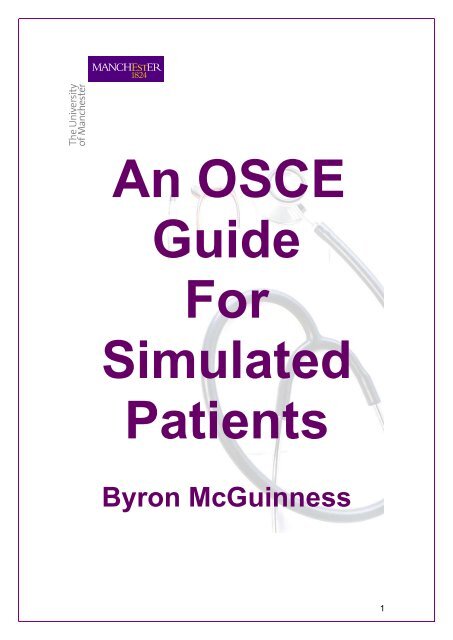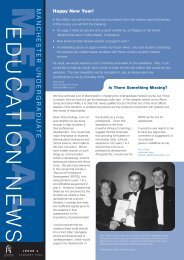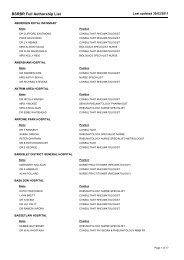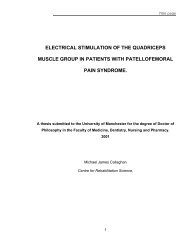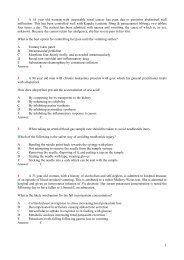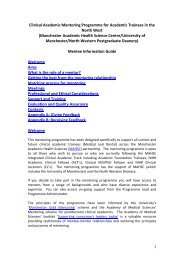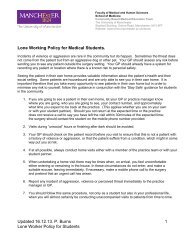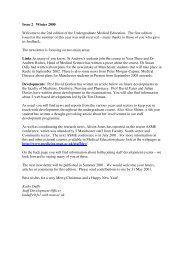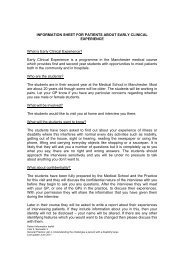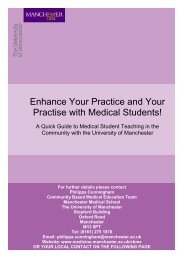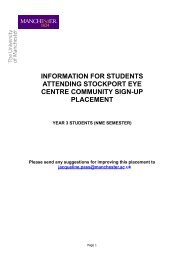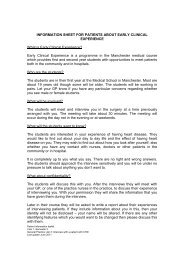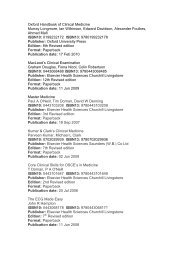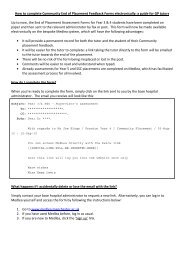A checklist of do's and don't for OSCEs - School of Medicine
A checklist of do's and don't for OSCEs - School of Medicine
A checklist of do's and don't for OSCEs - School of Medicine
Create successful ePaper yourself
Turn your PDF publications into a flip-book with our unique Google optimized e-Paper software.
An OSCE<br />
Guide<br />
For<br />
Simulated<br />
Patients<br />
Byron McGuinness<br />
1
Contents<br />
Page 3: Introduction by Dr Emyr Benbow<br />
Pages 4-5: The OSCE Examination<br />
Pages 6-7: St<strong>and</strong>ardised Patients<br />
Pages 8-11: OSCE Do’s <strong>and</strong> Don’ts<br />
2
Introduction<br />
It is very important that we assess the skills <strong>and</strong> knowledge <strong>of</strong> our<br />
medical students during their training, especially be<strong>for</strong>e they<br />
become qualified doctors. These assessments have to be fair to the<br />
students, so we mustn’t fail those who deserve to pass. They must<br />
also be fair to the patients as these students will soon be young<br />
doctors, so we mustn’t pass those who deserve to fail, or require<br />
additional training.<br />
Our simulated patients have a very important role to play in these<br />
assessments, <strong>and</strong> Manchester Medical <strong>School</strong> is justifiably proud <strong>of</strong><br />
their contribution.<br />
We were pioneers in the use <strong>of</strong> simulated patients many years ago<br />
<strong>and</strong> we continue to exp<strong>and</strong> <strong>and</strong> develop the role. We have also used<br />
<strong>OSCEs</strong> <strong>for</strong> many years. External examiners, who are senior<br />
examiners from other universities, consistently praise the high<br />
st<strong>and</strong>ard <strong>of</strong> our simulated patients in <strong>OSCEs</strong>. We want to maintain<br />
<strong>and</strong> improve our excellent reputation. To help us do this, Byron has<br />
produced this guide. I think it is very helpful <strong>and</strong> recommend you to<br />
read it carefully.<br />
We always welcome suggestions <strong>for</strong> improvement, so if you think<br />
there is any aspect <strong>of</strong> our <strong>OSCEs</strong> which needs to change, please<br />
speak to Byron.<br />
I look <strong>for</strong>ward to seeing you at our <strong>OSCEs</strong>.<br />
Dr Emyr Benbow<br />
Academic Lead <strong>for</strong> Assessment<br />
Manchester Medical <strong>School</strong><br />
3
The OSCE Examination<br />
What is an OSCE?<br />
OSCE st<strong>and</strong>s <strong>for</strong>:<br />
Objective<br />
Structured<br />
Clinical<br />
Examination<br />
The OSCE examination was first devised in the mid 1970’s by Dr R<br />
Harden (now Pr<strong>of</strong>essor), <strong>and</strong> his colleagues at Dundee University<br />
Medical <strong>School</strong>. <strong>OSCEs</strong> take place in many medical schools in over 50<br />
countries across the world including the UK, USA, Canada <strong>and</strong><br />
Australia.<br />
The OSCE<br />
The structure <strong>of</strong> the OSCE involves a range <strong>of</strong> skills being assessed at<br />
what are called ‘stations’. These range from clinical skills such as<br />
interpreting an x-ray, taking someone’s blood pressure to prescribing<br />
medication <strong>and</strong> examining various body systems. There are also<br />
communication stations at which students are assessed in terms <strong>of</strong><br />
their ability to interact <strong>and</strong> communicate with a ‘simulated’patient.<br />
Testing each student across a range <strong>of</strong> skills makes it is possible to<br />
build up a detailed picture <strong>of</strong> their overall strengths <strong>and</strong> weaknesses<br />
How does it work?<br />
Each student visits the same series <strong>of</strong> stations during an OSCE, with<br />
each station lasting 8 minutes. There is a gap <strong>of</strong> just one minute<br />
between each student. The examiner will grade the student during that<br />
gap.<br />
Why is it Objective?<br />
It is because each student is assessed using st<strong>and</strong>ardised marking<br />
principles <strong>and</strong> a specific mark scheme that can be applied by an<br />
4
examiner, irrespective <strong>of</strong> where the examination takes place. For<br />
example, the <strong>OSCEs</strong> taken by our students in years 3-5 occur on four<br />
different sites: Preston Royal Infirmary, Manchester Royal Infirmary,<br />
Sal<strong>for</strong>d Royal Hospital <strong>and</strong> Wythenshawe Hospital. The <strong>OSCEs</strong> taken by<br />
our first <strong>and</strong> second years involve examiners assessing the same<br />
scenario at the same time in different rooms at the Stop<strong>for</strong>d Building.<br />
One <strong>of</strong> the strengths <strong>of</strong> the <strong>OSCEs</strong> is that they assess, in an objective<br />
way, what it is that a medical student can do rather than just what<br />
they know.<br />
How are communication skills assessed?<br />
Communication skills are assessed using ‘st<strong>and</strong>ardised’ patients who<br />
are interviewed by a medical student <strong>for</strong> a defined period <strong>of</strong> time. The<br />
interviews are observed by examiners who use a common marking<br />
guide.<br />
There are basically two types <strong>of</strong> communication stations.<br />
History stations<br />
The student is required to take a medical history from a St<strong>and</strong>ardised<br />
Patient (SP), who will have been trained <strong>and</strong> provided with a scenario<br />
<strong>and</strong> character pr<strong>of</strong>ile prior to the day<br />
Explanation <strong>and</strong> planning stations<br />
Here, the student is asked to explain a procedure or perhaps seek<br />
consent <strong>for</strong> a procedure that the st<strong>and</strong>ardised patient’s character may<br />
need. The student may also be required to share in<strong>for</strong>mation with the<br />
patient as part <strong>of</strong> the explanation. Another typical task is to explain a<br />
diagnosis <strong>and</strong> potential treatment.<br />
As well as being examined <strong>for</strong> medical accuracy, each student is<br />
assessed on their ability to communicate effectively with a ‘simulated’<br />
patient. So such qualities as empathy <strong>and</strong> ‘patient-centeredness’ are<br />
key aspects in the assessment <strong>of</strong> each student’s per<strong>for</strong>mance. Other<br />
key skills that are assessed include opening <strong>and</strong> closing an interview,<br />
different questioning styles, <strong>and</strong> the ability to summarise <strong>and</strong> to<br />
structure a consultation in a logical way.<br />
5
St<strong>and</strong>ardised Patients<br />
What is a st<strong>and</strong>ardised patient?<br />
St<strong>and</strong>ardised Patients are members <strong>of</strong> the public who are asked to role<br />
play a character who may have medical issues <strong>and</strong> concerns. Each<br />
st<strong>and</strong>ardised patient is provided with a scenario/script that will outline<br />
the medical history <strong>of</strong> the character as well as important biographical<br />
details, aspects <strong>of</strong> the character’s social history <strong>and</strong> their underlying<br />
concerns.<br />
Confidentiality<br />
The scripts that you receive <strong>for</strong> an OSCE are part <strong>of</strong> the examination<br />
<strong>and</strong> should be kept completely confidential. Also, it is really important<br />
that you refrain from discussing the scenario on the day with other<br />
people, <strong>for</strong> example, students who may be acting as volunteers <strong>for</strong> the<br />
OSCE.<br />
Training<br />
It is important that the portrayal <strong>of</strong> a patient <strong>and</strong> the in<strong>for</strong>mation that<br />
is given in response to the students’ questions is st<strong>and</strong>ardised by<br />
everyone who plays the same character on an OSCE day. To facilitate<br />
this, you will be asked to attend a training session at the Medical<br />
<strong>School</strong>. The purpose <strong>of</strong> the training session is to discuss the scenario<br />
<strong>and</strong> deal with any issues that may not be clear in the script. At the<br />
training session you will also have the opportunity to role play the<br />
scenario with the other people who will be doing the same scenario(s)<br />
as you at one <strong>of</strong> the other hospital sites.<br />
Will I be marking the students?<br />
For the majority <strong>of</strong> the examinations you won’t be marking. However,<br />
you will be asked to mark in the first <strong>and</strong> second year exams, as well<br />
as the examination the third year students do in January.<br />
What else do I need to know?<br />
In general terms, you will be asked <strong>for</strong> your availability to work<br />
approximately 6 weeks be<strong>for</strong>e the OSCE takes place.<br />
How long does an OSCE last?<br />
An OSCE exam can be run over several days depending on the number<br />
<strong>of</strong> stations needed to examine all <strong>of</strong> the skills relevant to that year<br />
group.<br />
6
How long is an OSCE day?<br />
The OSCE day varies in length. It is possible that you may have to<br />
work until about 5pm. It is likely that you will be asked to arrive at the<br />
hospital where you are going to work at approximately 8.30am.<br />
How do I get paid?<br />
You will be asked to sign an attendance sheet at the hospital where<br />
you are working. Your fee will be paid into your bank account within<br />
two weeks <strong>of</strong> doing the work.<br />
Where do I go on the day?<br />
In the pack that you receive <strong>for</strong> each OSCE there will be a sheet giving<br />
you in<strong>for</strong>mation about where within the hospital you should go. You<br />
will also be provided with in<strong>for</strong>mation about the length <strong>of</strong> the day <strong>and</strong><br />
an emergency contact telephone number to use if you are delayed on<br />
the day or have any other problems with arriving on time.<br />
7
OSCE Dos <strong>and</strong> Don’ts<br />
All the following points came from the SPs who attended the OSCE<br />
training session <strong>for</strong> the Year 3 exams in February 2009. Thank you to<br />
all who contributed.<br />
Prior to the day<br />
Do<br />
-learn the role thoroughly in order that you can be a credible character<br />
<strong>for</strong> the students<br />
-keep the scenario confidential<br />
Don’t<br />
-add details that will change the emphasis <strong>of</strong> the script<br />
-discuss the role with others or let others see the details <strong>of</strong> the<br />
scenario<br />
On the day<br />
Do<br />
-arrive on time<br />
-confer with other SPs playing the same role <strong>and</strong> with your examiner in<br />
order to ensure st<strong>and</strong>ardisation<br />
-be suitably dressed <strong>for</strong> the character/situation<br />
-switch <strong>of</strong>f your mobile telephone<br />
Don’t<br />
-leave your scenario lying around <strong>for</strong> others, such as students, to pick<br />
up <strong>and</strong> read.<br />
You <strong>and</strong> the Examiner<br />
Do<br />
-talk to the examiner prior to the exam about what is required<br />
-check with the examiner to ensure you are being consistent<br />
8
Don’t<br />
-let the examiner change the script<br />
-let the examiner’s mark influence your mark. They may well be<br />
looking <strong>for</strong> different things to you<br />
You <strong>and</strong> the c<strong>and</strong>idate(s)<br />
Do<br />
-remember that the students will be nervous<br />
-come fresh to each c<strong>and</strong>idate<br />
-challenge jargon<br />
-give each student the opportunity to succeed<br />
Don’t<br />
-react subjectively to the c<strong>and</strong>idate<br />
-make personal remarks about the c<strong>and</strong>idates or talk about the<br />
students after they leave the OSCE station. You may be overheard<br />
The Exam<br />
Do<br />
-be consistent/st<strong>and</strong>ardised<br />
-stick to the script/ follow instructions on the script<br />
-be aware <strong>of</strong> time constraints<br />
-stay in character/role<br />
-listen <strong>for</strong> cues <strong>and</strong> prompts<br />
-give appropriate cues<br />
-remain pr<strong>of</strong>essional <strong>and</strong> discrete at all times, especially at the end <strong>of</strong><br />
an interview as the student is leaving<br />
Playing the role<br />
Do<br />
-use appropriate body language<br />
-be clear in what you say or do<br />
Don’t<br />
-get too emotionally involved in the role at the expense <strong>of</strong> the<br />
interview<br />
-over act<br />
-talk too much or take over the conversation<br />
9
-use misleading body language<br />
-allow personal likes or dislikes to interfere with your portrayal<br />
Responding to questions from the student<br />
Do<br />
-give correct in<strong>for</strong>mation when asked<br />
-get to the point quickly<br />
-answer all questions<br />
-respond appropriately<br />
-respond with yes/no or minimum amount <strong>of</strong> in<strong>for</strong>mation if asked a<br />
closed question<br />
-ensure that symptoms are given if requested by a student<br />
-reward open questions<br />
-keep to known facts. If it isn’t in the script the answer to a question<br />
should be ‘No’ or ‘I don’t know’<br />
-listen to the student to ensure that you answer the correct question<br />
-answer the question that is asked <strong>and</strong> no more<br />
Don’t<br />
-linger on irrelevant questions<br />
-give too much in<strong>for</strong>mation too soon<br />
-go <strong>of</strong>f at a tangent<br />
-give too much in<strong>for</strong>mation all at once<br />
-feel it is your responsibility to assist a student if they miss something<br />
in their questioning<br />
-be inconsistent<br />
Marking (If required)<br />
Do<br />
-be objective in your marking<br />
-treat each c<strong>and</strong>idate as an individual when marking<br />
-remember to be objective<br />
Don’t<br />
-base your mark on a small part <strong>of</strong> the interview. Think <strong>of</strong> the entire<br />
consultation<br />
-base your mark on how a student looks or dresses. If you think the<br />
student’s dress was inappropriate, indicate your view to the examiner,<br />
discretely, after the student has left the station.<br />
Byron McGuinness<br />
10
October 2010<br />
11


